With US debt issuance threatening to blow all fuses, foreign demand is an increasingly important question.
By Wolf Richter for WOLF STREET.
The US government’s recklessly ballooning debt has now reached $37.5 trillion. High on our worry list: Will foreign investors continue to buy this debt, or will even more of it have to be absorbed by US domestic investors?
If there is lackadaisical demand for this debt, yields rise until enough demand materializes. The US government will always be able to sell this debt, but at what yield?
If foreign investors are less than enthusiastic about buying US Treasury debt, it will put upward pressure on yields. And these yields affect private sector interest rates, such as mortgage rates.
But for now, longer-term Treasury yields are relatively low – the 10-year yield is barely above 4% – despite the potential inflation trajectory and the flood of new supply coming on the market that has to be absorbed by investors. It shows that for now there is still plenty of demand for this debt.
But the risk of foreign investors losing interest in Treasury debt and even just maintaining their holdings, rather than increasing them, would put upward pressure on yields, and this possibility is high up on our worry list, which is why we keep an eye on it.
Some countries — including the two that used to be by far the biggest foreign investors in Treasuries — have either been reducing their holdings or roughly maintaining them. But other countries have taken their place and have massively increased their holdings. So here they are.
All foreign investors combined piled on another $31 billion of Treasury securities in July, to bring the total pile to a record $9.16 trillion, according to Treasury Department data today. Over the past 12 months, they piled on $778 billion (red line in the chart below).
Of that total, $7.75 trillion (85%) were long-term Treasury securities (blue), and the rest were short-term T-bills.
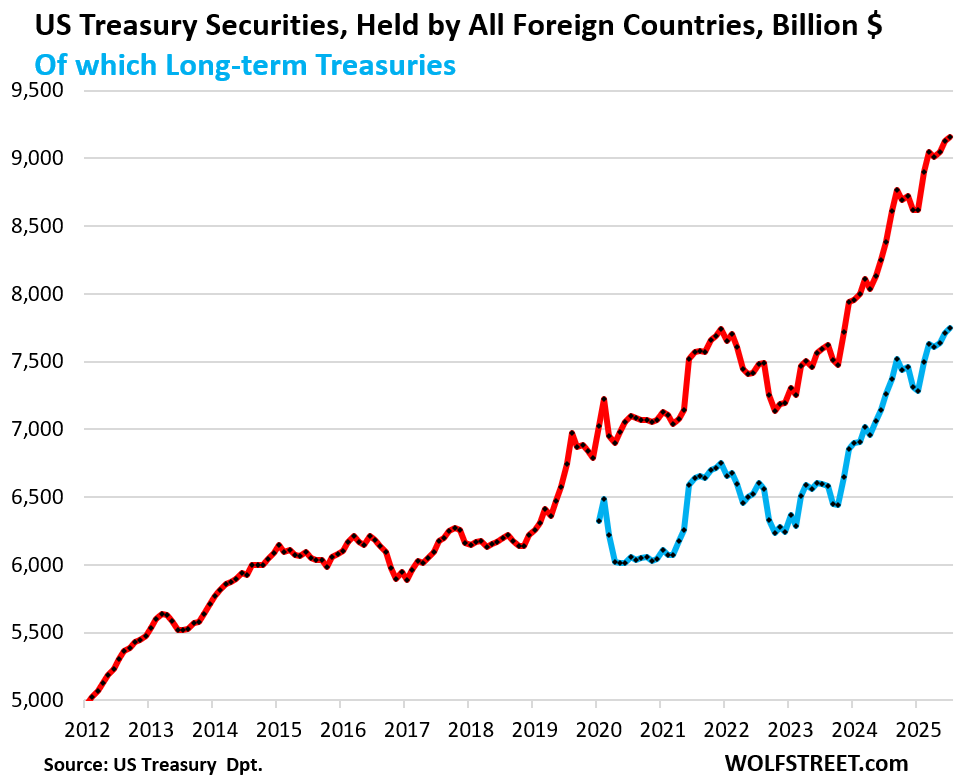
Private foreign investors have done most of the heavy lifting. These financial firms, companies, bond funds, individuals, etc., in foreign countries increased their Treasury holdings by $29 billion in July to a record $5.23 trillion (red in the chart below).
But “foreign official” holders, such as central banks and government entities, have shown less enthusiasm. Their holdings barely ticked up in July, to $3.92 trillion, and were down from years earlier (blue).
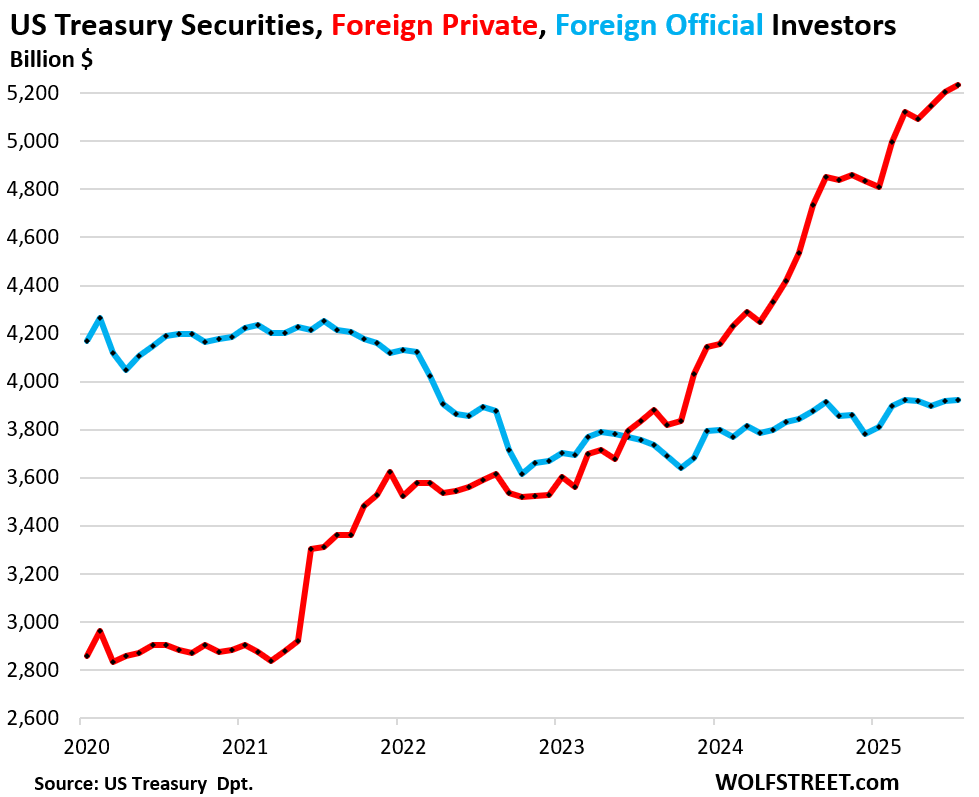
China and Hong Kong versus the Euro Area.
China and Hong Kong combined shed $20 billion in July, and $37 billion in the 12-month period, bringing their holdings to $979 billion (blue in the chart below).
The Euro Area continued to load up on Treasury securities, adding $44 billion in July and $242 billion over the past 12 months, bringing their holdings to $1.91 trillion (red).
The biggest holders in the Euro Area are the financial centers (Luxembourg, Ireland, Belgium) and France, whose banking system also functions as a global financial center. Their combined holdings accounted for 81% of the Euro Area’s total holdings. More in a moment.
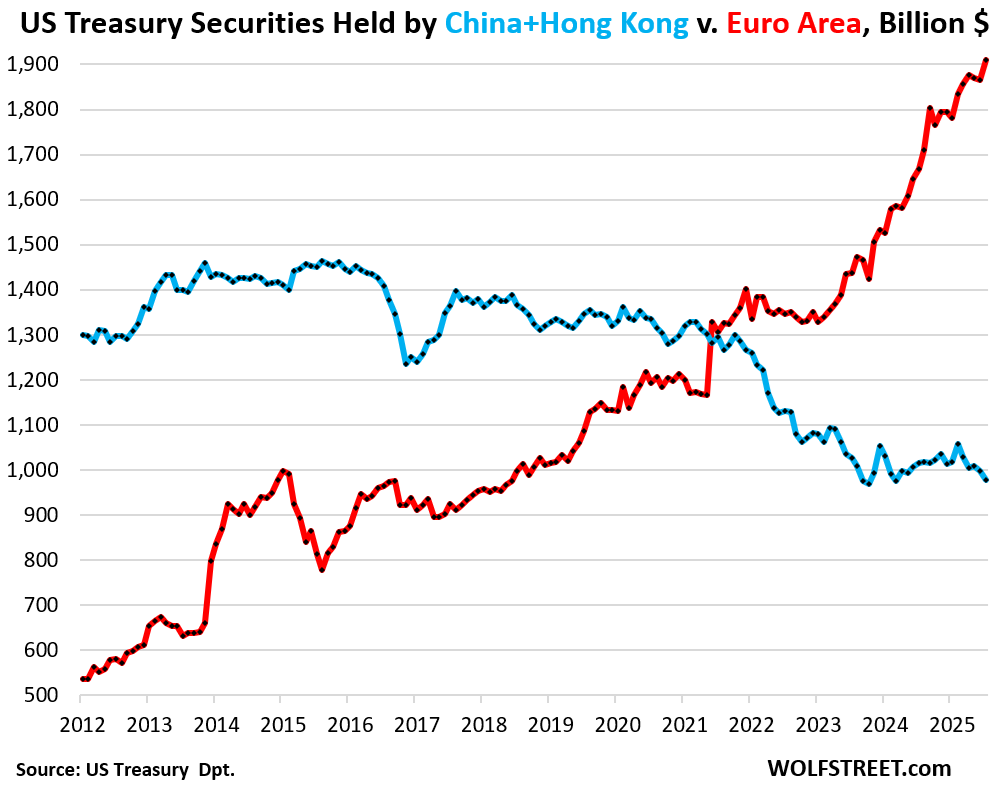
Japan’s holdings of Treasury securities rose by $4 billion in July, and by $58 billion over the 12-month period.
Japan’s holdings haven’t gone anywhere in 12 years despite the large fluctuations in between.
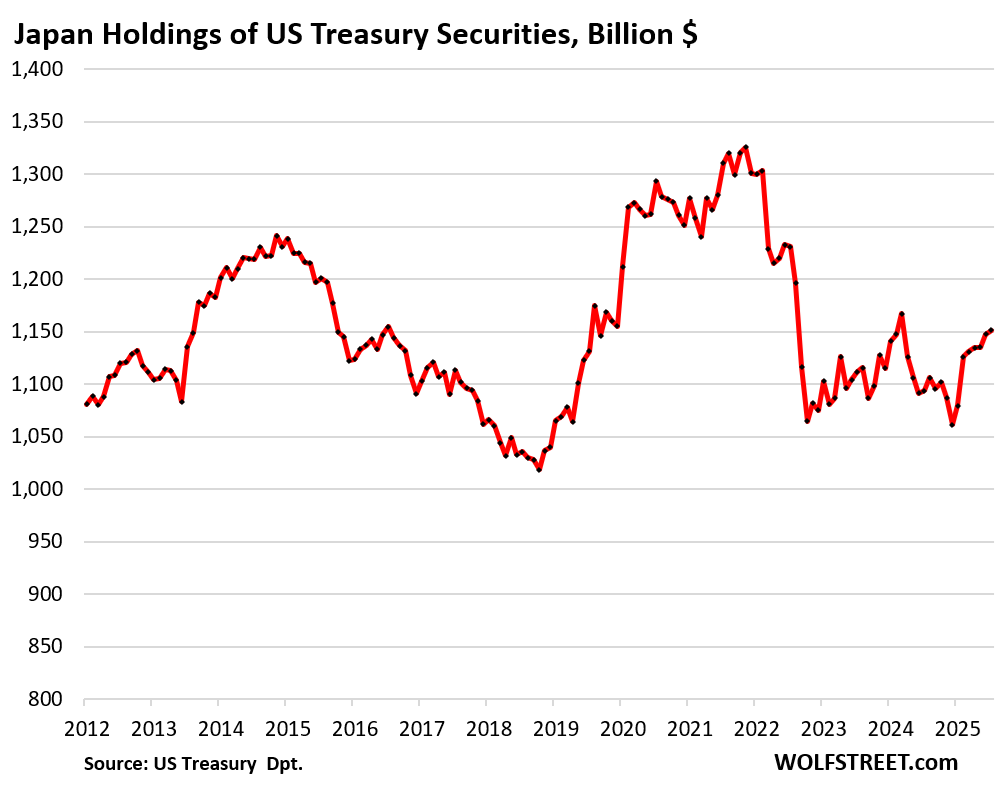
The seven largest financial centers have massively piled on Treasuries over the years, more than doubling their holdings over the past 10 years. In July, they added $41 billion, and over the past 12 months $373 billion, bringing their total to $3.05 trillion.
A portion of the holdings at these financial centers are held by US entities. These countries specialize in handling the financial holdings of global companies, individuals, and governments. Ireland is a favorite for US Big Pharma and Big Tech to store their profits. Belgium is home to Euroclear, which has $40 trillion in assets under custody for companies, governments, and wealthy individuals around the world. The United Kingdom here means the “City of London,” the top financial center in the world.
Changes in July, and total Treasury holdings:
- United Kingdom: +$41 billion, to $899 billion
- Cayman Islands: -$4 billion to $439 billion
- Belgium: -$5 billion to $428 billion
- Luxembourg: +$0.4 billion, to $428 billion
- Ireland: +$7 billion to $324 billion
- Switzerland: +$2 billion to $303 billion
- Singapore: -$1 billion to $254 billion.
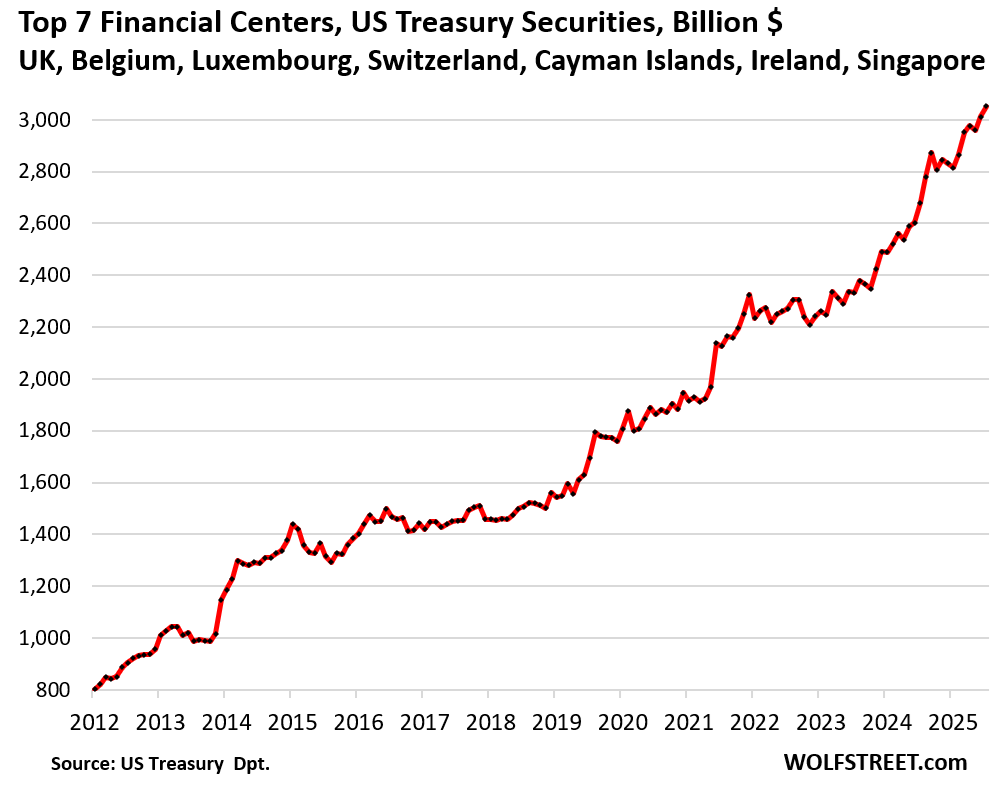
The United Kingdom — so the “City of London” financial center — is by far the biggest financial center of the seven, and globally, and its Treasury holdings have spiked over the past two months by nearly $100 billion:
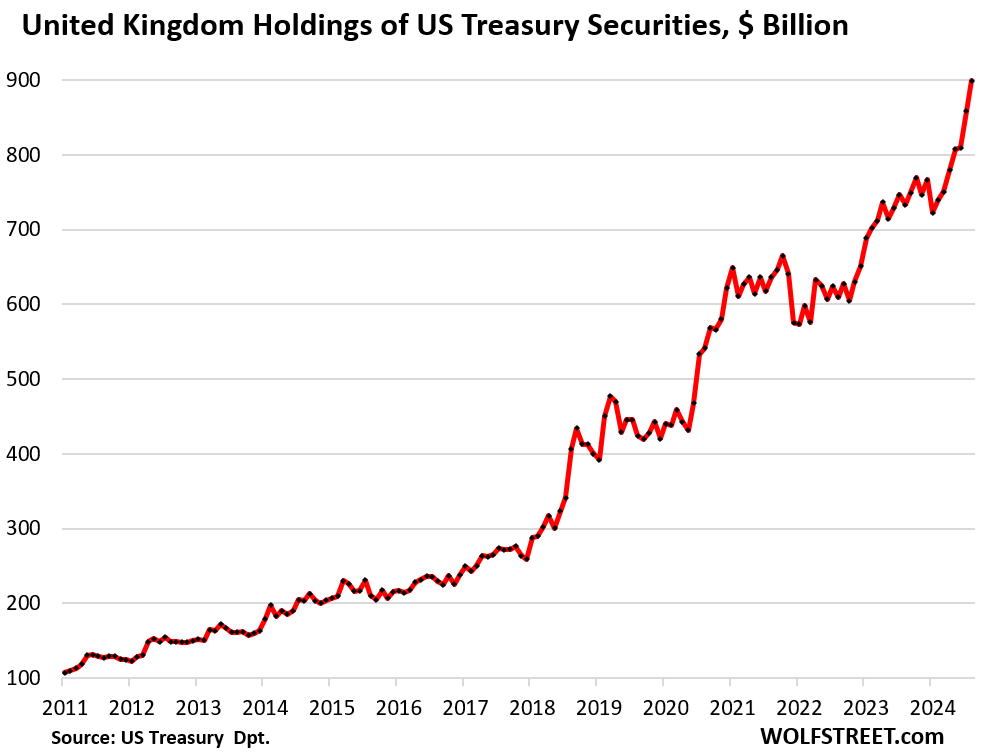
France’s holdings rose by $17 billion in July, and by $101 billion from a year ago, to a record $392 billion. France’s megabanks are global financial centers.
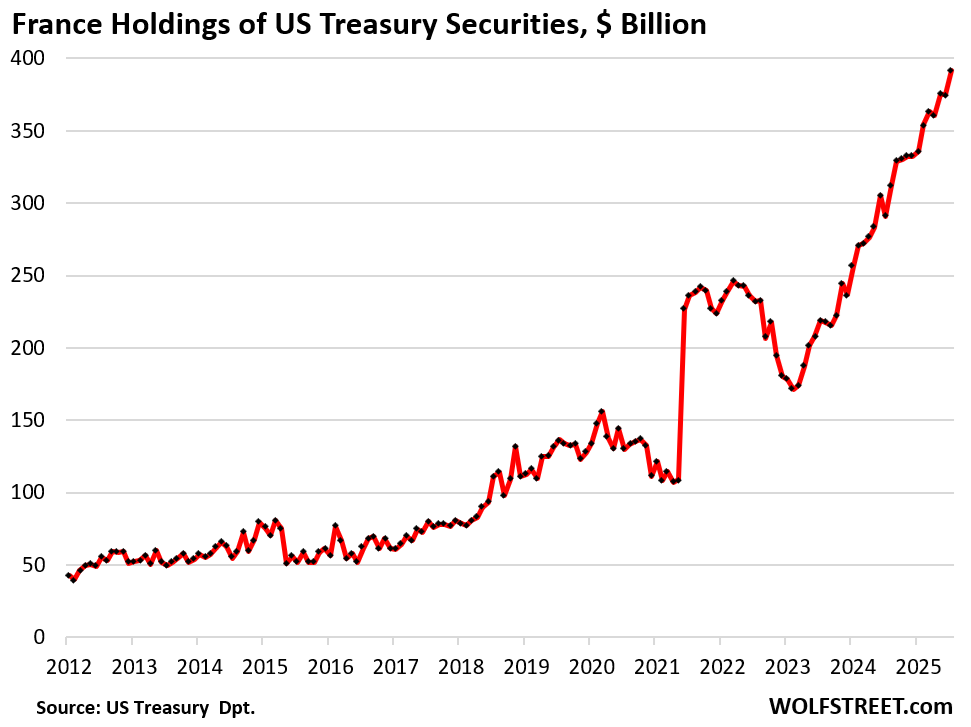
Canada’s holdings have been gyrating up and down all year. In July, they plunged by $57 billion from the record in June, to $381 billion.
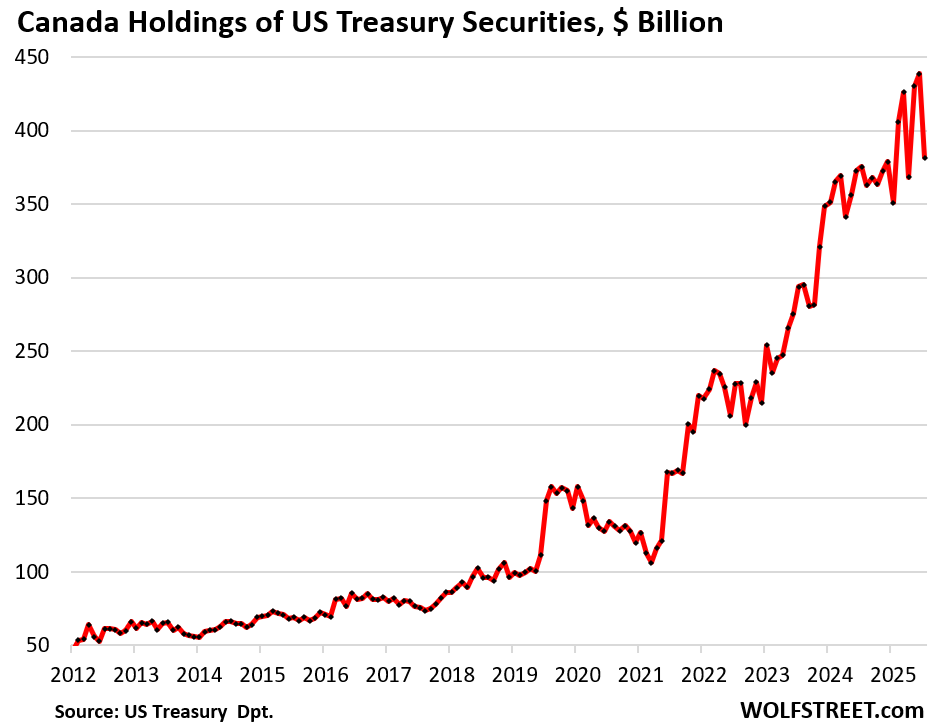
Taiwan’s holdings rose by $7 billion in July to a record $300 billion, and were up by $22 billion year-over-year:
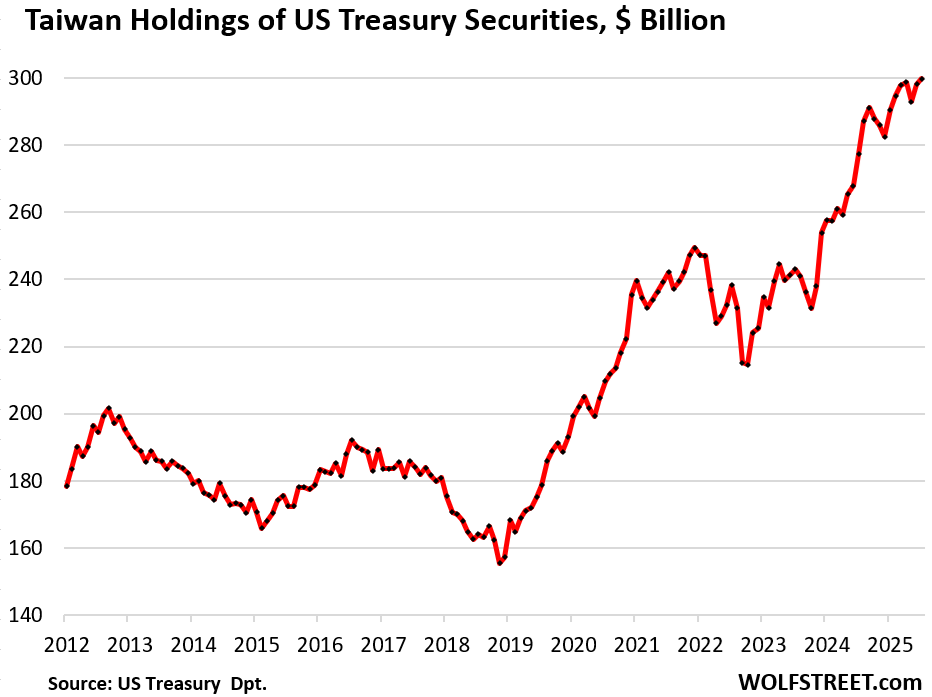
India has been unloading for the second month in a row. In July, its holdings dropped by $8 billion and year-over-year by $19 billion, to $220 billion. The high was in September 2024 at $247 billion:
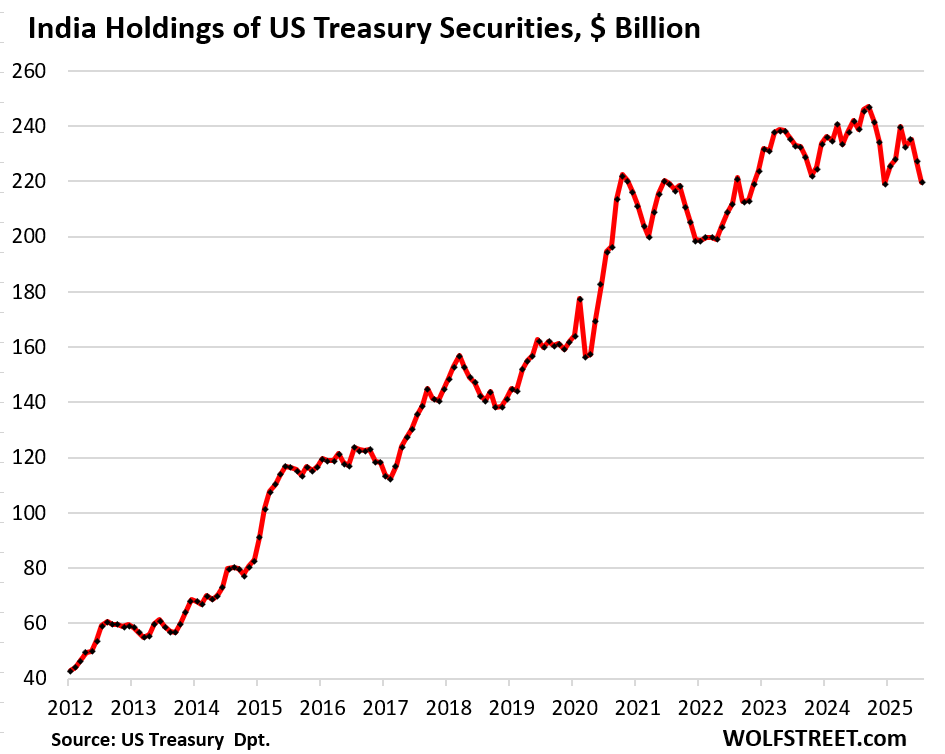
Brazil’s holdings have long careened lower and in July plunged by $14 billion and year-over-year by $27 billion, to $202 billion. Since the peak in 2018 ($318 billion), Brazil’s holdings have dropped by 36%:
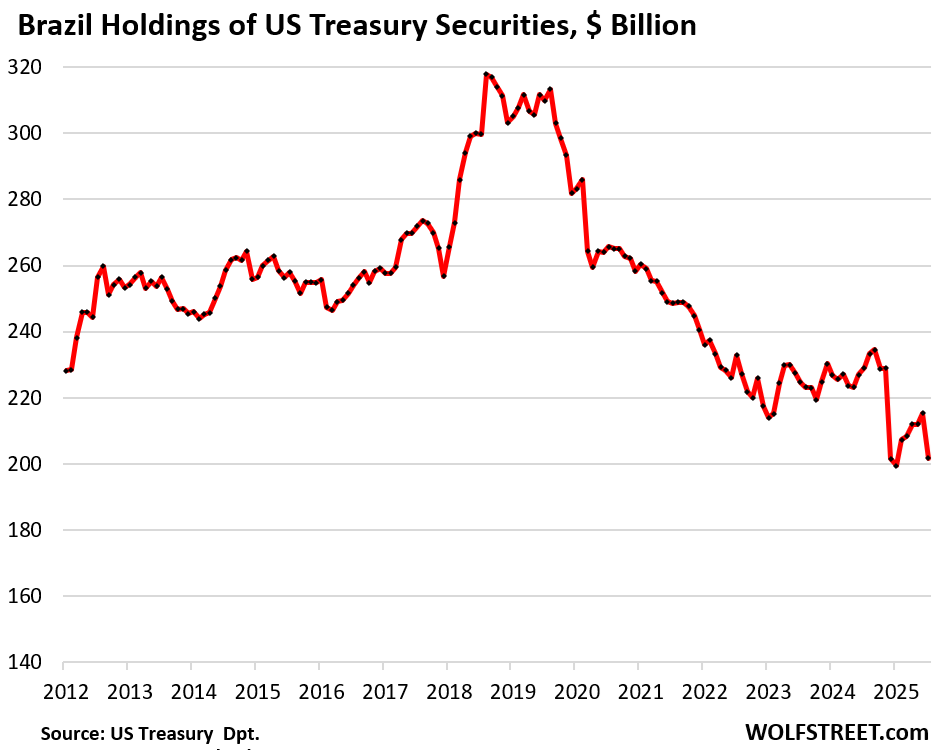
Enjoy reading WOLF STREET and want to support it? You can donate. I appreciate it immensely. Click on the mug to find out how:
![]()


MW: Treasury yields rise after Fed rate cut, with Powell’s FOMC in no ‘sprint’ to loosen policy
U.S. debt is too big to fail?
The US debt cannot fail by definition because the US controls the currency in which the debt is issued, and in theory, it can always print more to services this debt.
The issue is yields and inflation.
Thus when foreign investors have had enough, the Fed will buy what they have to.
By this logic, Russia or Argentina couldn’t fail either, but they did.
What are they purchasing, Wolf Man? I’d call it lending the town drunk money, hoping they’ll get paid back in scrip that someone else will accept as payment for good and services, and hoping that the scrip isn’t completely devalued.
In a way, aren’t they ‘purchasing’ risk?
It’s an interest-paying store of wealth in US dollars. If you live in a foreign country and you have income in local currency, but financial obligations (or aspirations) in US dollars then you need to store your income in US dollars. If you live in Turkey and don’t trust your local currency, then you need a better shell hole. It’s not just the yield, but the currency that matters.
2 of the BRICS are selling
The BRICS are already irrelevant except the C.
Europe is worried about a Russian invasion, Taiwan about a Chinese invasion. If I lived in Europe or Taiwan I would want a big chunk of my money overseas. Note that Japan, India, and Brazil are a lot less interested in buying Treasuries.